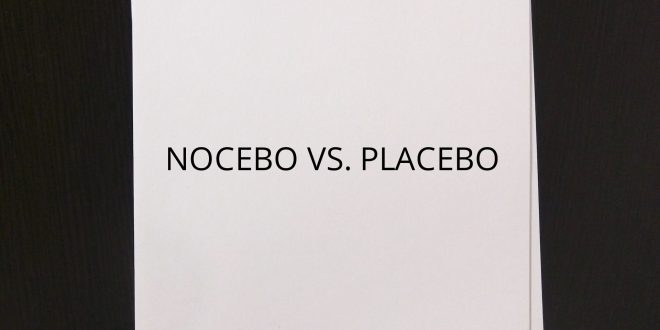What if ingesting a substance that is completely safe might make you ill? What if a sugar pill made you sick or a false dosage of lactose gave lactose-intolerant individuals unpleasant stomach symptoms?
The odd thing about medicine and the brain is that they frequently interact in utterly unexpected and illogical ways. This is especially true of the mysterious phenomena known as the nocebo effect.
The majority of us are already aware of the placebo effect. A control group is frequently given an inert substance (commonly a sugar pill) as part of medical research. This offers a baseline against which researchers can measure the efficacy of the new medication being tested. The participants in this group are informed that the placebo effect is real; interestingly, on occasion, they do experience an improvement in their symptoms merely because they anticipate that the medication will help their symptoms.
The nocebo effect is an opposing tendency that has largely gone unnoticed by the study community. Simply put, it is the phenomena where inert compounds or mere thoughts of substances have an adverse impact on a patient or research subject. Some people experience symptoms before learning about the possible adverse effects of a drug or procedure. Similar to the placebo effect, it is still poorly understood and is believed to be the result of both Pavlovian conditioning and an expectation-related response.
One of the most in-depth analyses of the nocebo effect to date was released by researchers from the Technical University of Munich in Germany. They studied 31 empirical studies that dealt with the phenomena in order to analyze the underlying biological mechanisms and the difficulties it poses for clinicians and researchers. They came at the following conclusion: despite its puzzling nature, the nocebo effect is remarkably widespread and should be regularly taken into account by medical practitioners.
The researchers found that in several of the tests they examined, individuals’ exposure to unpleasant side effects was significantly increased by the hint or expectation of pain. For instance, 50 participants with chronic back pain were given a flexibility test in one study. While the others were not, half of the participants were informed that the test might be uncomfortable. The first group underwent the exact same procedure, but thereafter experienced much more discomfort.
In a another study, participants were given the medication finasteride to aid with the symptoms of prostate illness, and half of them were informed that it could lead to erectile dysfunction while the other half were kept in the dark about this possibility. Comparatively, just 15% of the uninformed group claimed to have had any experience with ED, compared to 44% of the first group.
The nocebo effect may possibly have lethal potential. Researchers found a person who tried suicide by ingesting 26 tablets in one case study. Based purely on the assumption that the overdose of tablets would be fatal, the patient had dangerously low blood pressure and needed fluid injections to stabilize him even though they were only placebo tablets with no biological mechanism to damage him even at such a large quantity. The symptoms disappeared rapidly after it was discovered that they were sugar pills.
The researchers advise physicians to reevaluate widely held notions about how to treat pain in order to prevent exaggerating unpleasant side effects. It’s generally accepted that the best strategy to reduce worry is to adequately prepare a patient for pain, for example, “this might hurt quite a bit.” However, one experiment that was examined revealed that the words a doctor used before giving radiographic drugs had an impact on the level of pain felt. Patients felt increased discomfort the more often the terms “sting,” “burn,” “hurt,” “terrible,” and “pain” were used.
A doctor faces a moral conundrum when attempting to avoid situations like these because minimizing the patient’s agony could conflict with informing them about the process. The authors of the study encourage physicians to balance this conflict by emphasizing benefits, reframing warnings as, “The majority of patients handle this well,” and, in some situations, obtaining patients’ consent to withhold information concerning some mild side effects.
Why negativity is more harmful than you think
Here, I will share with you an experiment of a famous scholar Ibn Sina (Avicenna). This experiment show us how negative thinking can harm us badly. He tested it on two lambs. He carried out a medical examination by placing a wolf in one of the side cages and two identical lambs in two different cages. One of the lambs was able to notice the wolf while the other one wasn’t.
Even though the wolf did not physically approach or even threaten the lamb, the lamb that could see the wolf perished a few months later from extreme stress and dread. The other lamb who had not seen the wolf continued to have a healthy and happy life.
This experiment demonstrated the strength and impact of our minds and bodies. Even if we are not aware of the harm that fear, worry, tension, and negativity are doing to us inwardly, they are nonetheless harmful.
This same thing implies on people too. We have to be really careful what we choose to believe in. Negative thought can do a lot of harm to us. We need to think more positively, laugh a lot, hug each other, spend time with positive people. That is good for our health. Ibn Sina also said: ” The power of thoughts can cause you either illness or recovery”. Be aware of this. Filter out the negativity, it slowly degrades us from the inside.
I hope this helped you at some level, feel free to share it with others, and share your thoughts with us in the comment section. Thank you for reading. Sending lots of hugs and love to all of you!
In the first source, you can find the links to the researches and studies mentioned in this article.
Sources:
 MENTPSYCH Meet Your Self
MENTPSYCH Meet Your Self




